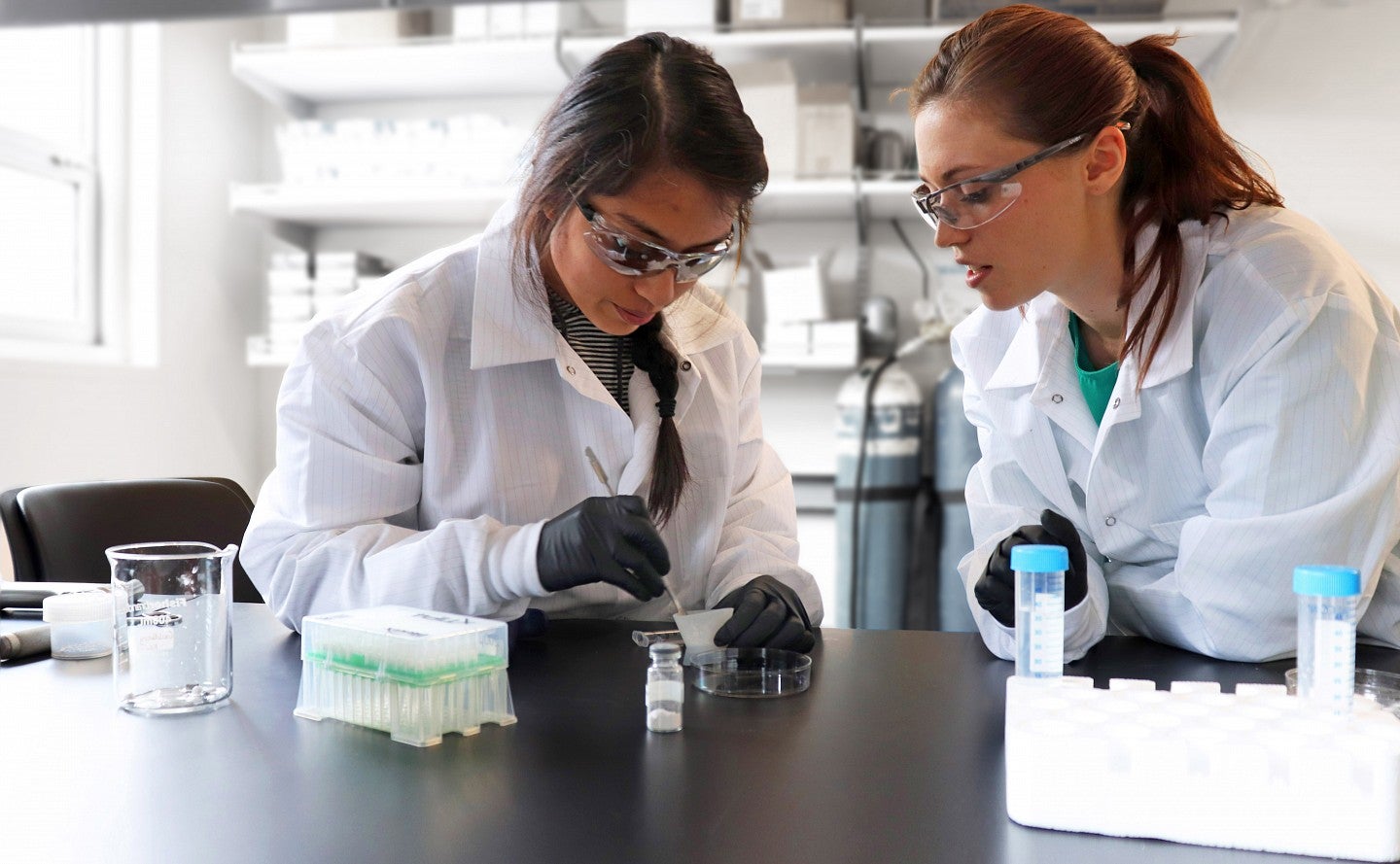
Meet the 2019-2020 Knight Campus Undergraduate Scholar Recipients
A 12-month research experience for UO undergrads
The Knight Campus Undergraduate Scholars Program pairs promising undergraduates with research mentors — graduate students, postdocs, and faculty members — immersing them in a 12-month, comprehensive research experience in Knight Campus-affiliated labs.
The cohort of young scientists are taking on independent research projects in a diverse set of fields, from musculoskeletal regeneration to disease modeling. Additionally, the Knight Campus Undergraduate Scholar recipients participate in tailored professional development activities to prepare them for the next steps in their education and careers.
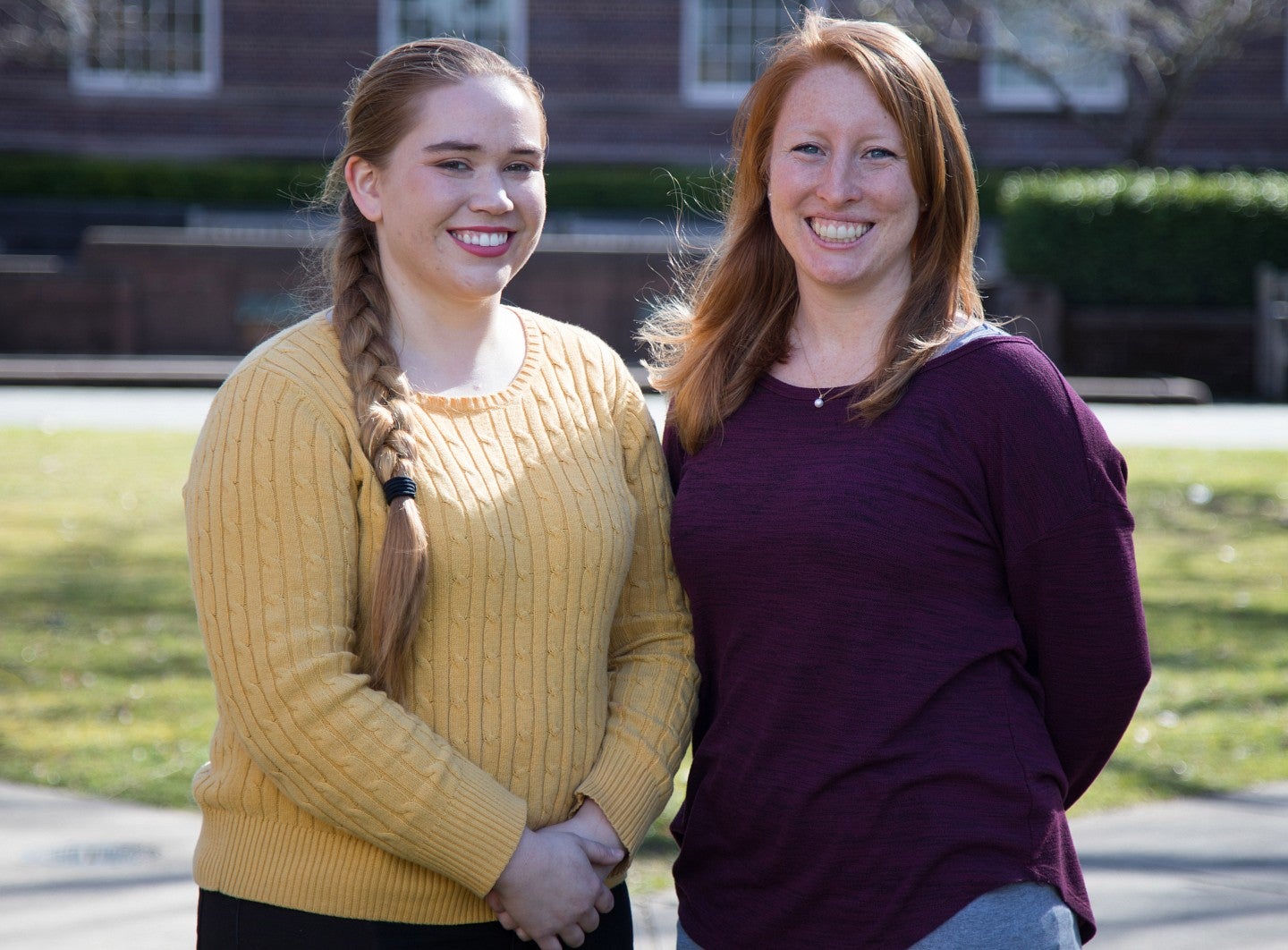
Robin Black
Major: Biology
Pictured with: Michelle Massaquoi, Mentor (right)
Lab: Karen Guillemin
Robin came to the University of Oregon from the small town of Lookingglass, near Roseburg, Oregon. Her research in the Guillemin Lab focuses on host-microbe interactions in zebrafish. "I study the impacts of microbial-secreted proteins on host beta cell regeneration, and am interested in understanding how bacteria within the gut induces changes within the cells of the host," says Black. Zebrafish are well-suited for the identification of novel targets associated with the risk, development, and treatment of diseases. Her research on zebrafish allows Black to make observations that could translate into discoveries for other species. "Being a Knight Campus Undergraduate Scholar gives me the chance to present my research in multiple ways," Black explains. "To faculty and mentors, and to the general public." As far as her career goals, Black wants to continue her research on zebrafish and other model systems for studying metabolic diseases and development. "I want to take my research further and one day apply it to humans," says Black. She explains that she is particularly interested in research related to diabetes. "I want my research to one day make a difference in people's lives."
Michelle Hernandez
Major: Biology
Mentor: Kelly Hyland
Lab: Robert Guldberg
Sponsored by Thermo Fisher Scientific
Michelle visited the University of Oregon her junior year of high school and immediately fell in love. A native southern Californian, she welcomed a change in scenery and was drawn to the UO's biology program. Fast forward a few years later, and she is now researching musculoskeletal regeneration in the Guldberg Lab. "I have always been intrigued by the human body and how it functions," says Hernandez. She currently studies cartilage degeneration in osteoarthritis, as well as potential regenerative therapies to mitigate joint deterioration associated with the disease. Professionally, Hernandez says she can see herself in multiple areas of medicine. "My goal is to advance medicine for our overall benefit," she explains. "Whether that is through helping patients as a physician's assistant, or advancing our knowledge through research." As a first time researcher, Hernandez says the Knight Campus Undergraduate Scholar Program has been a tremendous resource for her. "Everyone I worked with helped me get caught up on research and trained me on anything that needed further explanation," says Hernandez. "It was also relieving to hear that Bob Guldberg was in my shoes as an undergrad, and didn't know if he wanted to go to med school or get into research. That gives me faith that I, too, will figure out which path is best suited for me." Working in the Guldberg Lab has inspired her to pursue a double major in human physiology. "This whole experience has opened the doors to different possibilities," says Hernandez. "I know that the knowledge and skills I've gained here will help me during my next chapter in the medical field."
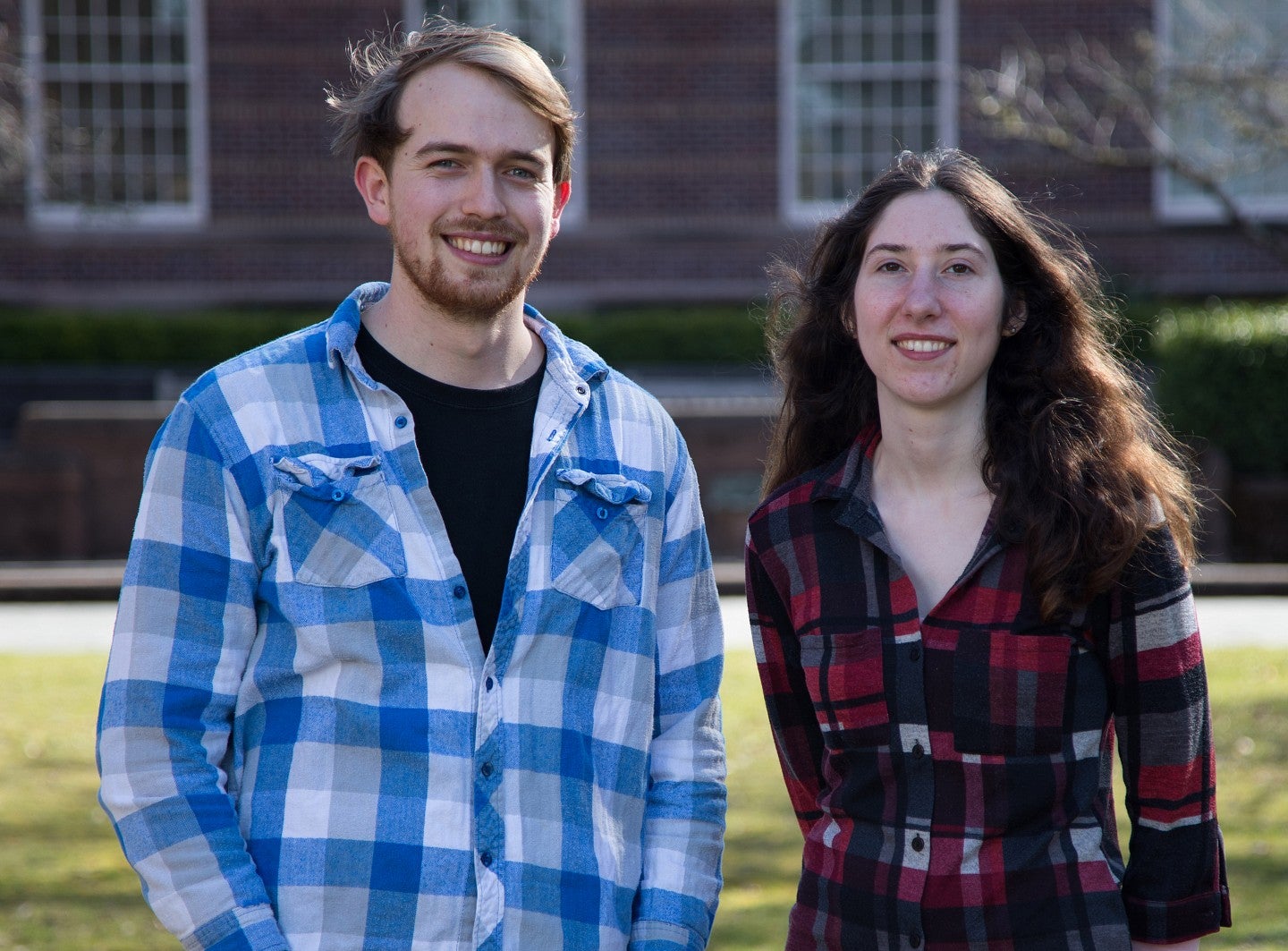
Russell Nickels
Major: Human Physiology
Pictured with: Hazel Fargher, Mentor (right)
Lab: Darren Johnson, Michael Haley
Russell came to the University of Oregon from the coastal town of Brookings, Oregon. As a son of two parents in the medical field, Nickels knew from a young age he wanted to explore medicine. As a human physiology major, he is even more fascinated with the human body. "This major has given me an entirely new perspective on the structure of the human body and how it functions," he explained. Currently, Nickels is working on a collaborative physical organic chemistry effort between three UO chemistry labs (the Johnson, Haley, and Pluth Labs). "We are working on making fluorescent carbon-based molecular probes that can selectively and reversibly bind biologically relevant anions, such as hydrosulfide (HS-) and hydroselenide (HSe-),” says Nickels. "One of the ultimate goals of the project is to enable us to insert these probes into biological systems and follow the anions to better understand their role in biological mechanisms." Currently, most probes that have shown success binding these anions are not water-soluble, which makes them difficult to put into biological environments. "We are using the current framework and trying to make these probes water-soluble, which is key to using them in a biological context." Professionally, Nickels wants to go to medical school, and then become a pediatric physician. "Being a Knight Campus Undergraduate Scholar has given me a new appreciation for medicine because it has given me a firsthand view of all of the hard work, collaboration and trial-and-error that goes into scientific research, which is truly the foundation of medicine."
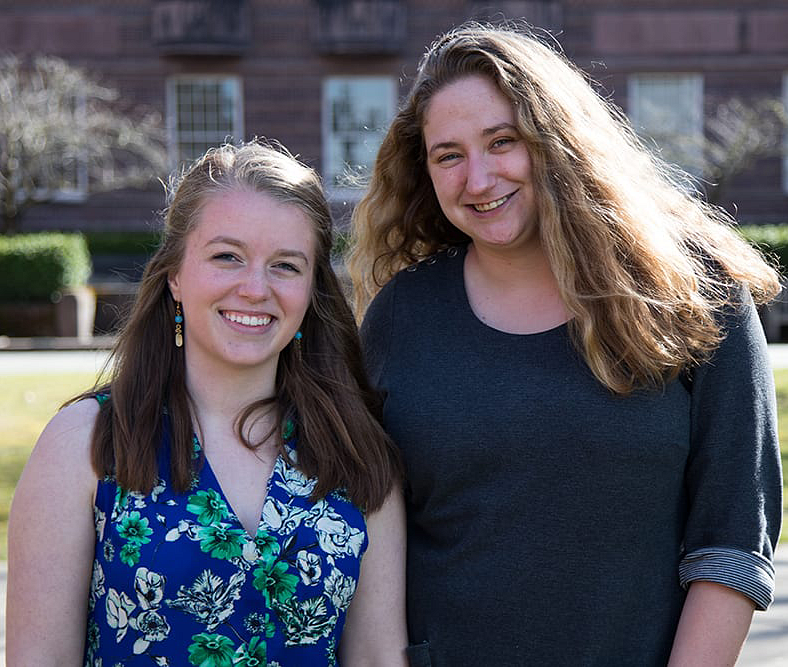
Emily Niebergall
Major: Biology
Pictured with: Emily Beck, Mentor (right)
Lab: Bill Cresko
Emily came to the UO after real-life experiences led to her decision to study biology. "I have always had a passion for science, but I became very interested in combatting infectious diseases after taking missionary trips to developing countries," says Niebergall. Niebergall's research in the Cresko Lab focuses on disease modeling using threespine stickleback fish. "We know a lot about this fish and its evolution," says Niebergall. "One characteristic is that they can change really quickly, from an evolutionary standpoint, which means there are a lot of different populations we can study at once." The evolution of this fish is now part of her thesis, which explores the adaptive immune system and cell-mediated immunodeficiencies. Professionally, Niebergall hopes to apply to a doctoral program to study immunology, specifically diseases affecting people in developing countries. "One day, I hope to apply my research to humans,” says Niebergall. “So, I think it is important that the Knight Campus Undergraduate Scholars Program not only teaches us how to become scientists, but how to become ethical scientists."
Ian Torrence
Major: Biochemistry
Mentor: Sean Fontenot
Lab: Darren Johnson
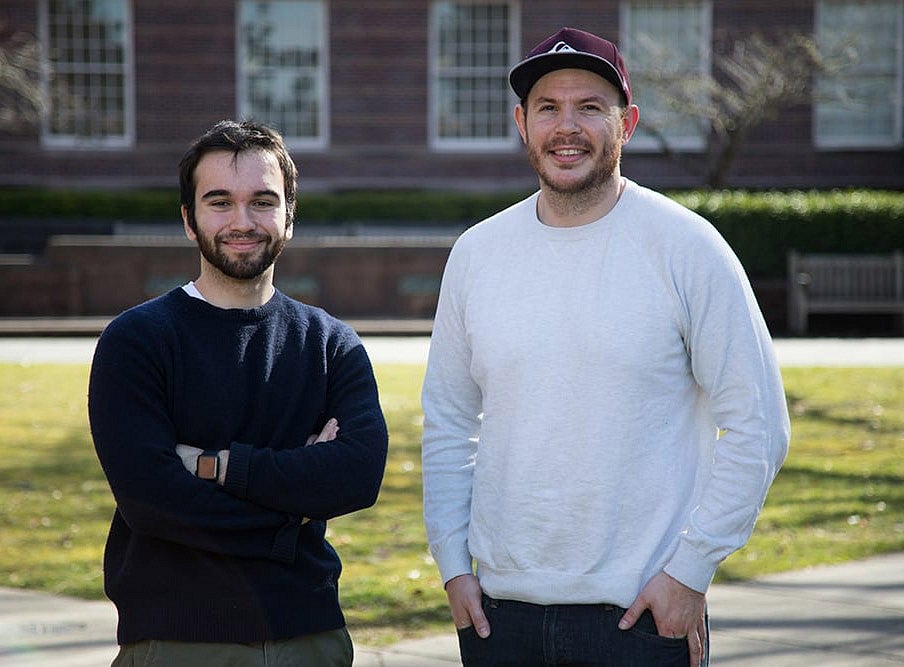
Dan Tudorica
Major: Biochemistry
Pictured with: Arden Perkins, Mentor (right)
Lab: Karen Guillemin
Sponsored by Thermo Fisher Scientific
Dan attended high school near Portland and soon after decided he wanted to attend the University of Oregon. "While my primary objective is to go into the medical field, I’m currently in love with biochemistry at the UO," says Tudorica. "It's a good balance between practical skills and interesting theory." He is currently studying chemotaxis to investigate how bacteria sense and respond to their environment, a topic important to understanding many human diseases. "I do biochemical experiments on the scale of proteins as well as more macro-level cell biology," he explains. "My goal is to go into an Md-PhD program after this," says Tudorica. "I've started to love research and the practice of untangling questions about the natural world." He says that the skills he's gained as a Knight Campus Undergraduate Scholar will help him with his future research. "A major part of being a researcher is collaboration," Tudorica explains. "Being involved in this group of students who are in the same place in their careers, but in different academic areas, has helped build my skills as a collaborator and feel involved with a community of scientists."
